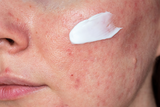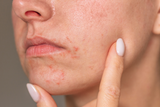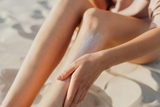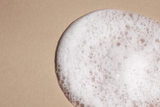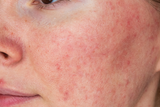Easy Peasy You
Switch to natural cosmetics: In 4 steps to your natural cosmetics for sensitive skin
Posted by Lara Schimweg on
If you pay attention to a few things, you can also care for your sensitive skin with natural cosmetics
Would you like to switch your skin care for face and body to natural cosmetics ? Now you are probably asking yourself: Where should I start and what is there to consider? Unfortunately, natural cosmetics are not that easy, especially for sensitive skin.
Nice that you want to use natural cosmetics . Natural skin care can have a number of benefits for your skin. But maybe you have already noticed that there are also some pitfalls with natural cosmetics. Some products are not tolerable for everyone or cause inflammation and pimples to develop. Or they trigger allergies and other sensitive skin conditions.
In this article you will get an initial orientation on how to deal with the disadvantages of natural cosmetics. In the end, only one thing counts: you will know what to consider and how to find more natural alternatives to your current conventional care products.
Nice that you want to use natural cosmetics . Natural skin care can have a number of benefits for your skin. But maybe you have already noticed that there are also some pitfalls with natural cosmetics. Some products are not tolerable for everyone or cause inflammation and pimples to develop. Or they trigger allergies and other sensitive skin conditions.
In this article you will get an initial orientation on how to deal with the disadvantages of natural cosmetics. In the end, only one thing counts: you will know what to consider and how to find more natural alternatives to your current conventional care products.
With these 4 steps you can start your conversion to natural cosmetics
1. Take it slow
Understandable! You would love to walk through your bathroom now and throw away all the old products and then go shopping for good natural cosmetics. That would feel good. However, your skin does not like radical changes. Even if it is natural cosmetics.It is best to start with your face cream. Then you can step up: Add a new natural product to your care routine about every 2-3 weeks. This gives your skin time to get used to new creams or serums. Incidentally, when it comes to natural cosmetics, less is usually more.
2. Pay attention to your skin type
First of all, you should find out what skin type you have. Especially with your skin care – but also with make-up. Surely you have adapted your previous cream to your skin type. It is no different when switching to natural cosmetics. Here, too, you are looking for a product that suits your skin individually. (A blog article on how to find out your skin type will appear here soon. Subscribe to our newsletter so you don't miss the article.)Especially with oily skin, combination skin or very sensitive skin, it is not always easy to find suitable natural cosmetics. Oily skin often needs less fat and more moisture. Unfortunately, there are very few light creams in natural cosmetics. A cream that is too rich could possibly cause pimples to develop. You can avoid this by layering your products. Find a good moisturizer and just put a few drops of oil over it. Or you are looking for a particularly light water-based cream . For very dry, uncomplicated skin, it is easier to find suitable creams in natural cosmetics. Since it often tolerates oils and rich butters well. However, if you are prone to pimples or are sensitive, a greasy cream can lock up your skin.
Even slightly dry skin that reacts sensitively benefits from layering products. Because an additional rich oil over your cream can make your care much more individual for your skin type in no time. This gives you more control over how much and what gets into your skin. Another plus: if you do this, you can easily incorporate active ingredients into your routine if you need them.
3. How to recognize natural cosmetics
Natural cosmetics are trendy. More and more brands (including the conventional ones) are using this trend. They pack the creams in green packaging with green messages. And a little plant extracts are also in it. How to distinguish what is really natural?Seals can help you for initial orientation when switching to natural cosmetics. The best-known natural cosmetics seals are BDIH , Eccocert and Natrue . All seals have different requirements. However, they all guarantee that the ingredients contained (with a few exceptions) are of natural origin.
However, natural cosmetics seals say nothing about how compatible a product is. There are even some ingredients commonly used in natural cosmetics that can be very irritating to the skin. Essential oils such as witch hazel but also citrus extracts are often found. These can trigger contact allergies, make skin more sensitive and irritate sensitive skin types even more.
Incidentally, brands without a seal can also be real natural cosmetics. It always depends on the ingredients.
4. Check ingredients
Don't worry: you don't have to be a chemistry professional. For starters, use a few easy peasy apps. The apps Codecheck and Toxfox give you a quick overview. Above all, they evaluate the ingredients according to whether they are sustainable for the environment. You can check whether your cosmetics are healthy for your skin on the hautschutzengel.de website . So you already have a rough overview of whether the product is suitable.A few things are unfortunately not considered in all apps. Therefore, pay particular attention to the following ingredients in natural cosmetics and natural skin care.
Alcohol in natural cosmetics
Many natural cosmetics use alcohol for preservation. Sure, parabens and co have to be replaced somehow. However, not all alcohol is the same. Just make sure that your natural cosmetics do not contain any drying alcohols. You can roughly orientate yourself on the fact that the word "alcohol" should not be found in the list of ingredients. Although there are a few exceptions here. (A list of good and bad alcohol will appear here soon. Subscribe to our newsletter to not miss the post.)Essential oils - the fragrances of natural cosmetics
Conventional natural cosmetics often contain essential oils. They serve as a natural substitute for synthetic perfume. Essential oils protect plants from pests, so they act like plant pesticides. Therefore, they can also preserve cosmetics.You can certainly imagine: Even if essential oils smell nice and have a calming effect due to the smell - our skin doesn't like them that much. You may have had bad experiences with natural cosmetics. It may be due to the essential oils irritating your skin.
If you have sensitive skin, you may have a reaction to essential oils. Also, be careful if you are prone to allergies. Because natural cosmetics also means that more plant-based ingredients are used.
To be on the safe side, it is best to buy natural cosmetics that do not contain any essential oils. Here's how to identify essential oils.
Unfortunately, there are still not that many natural cosmetics brands that do without essential oils completely. Judge for yourself which compromises you want to make.
Our tip: Wash cleansing products off your skin quickly. Hair care does not come into direct contact with the skin of the face. With such products you can rather overlook it. Unless your scalp is sensitive.
By the way: Also flower hydrolates, like Rose water is a fragrance and can irritate the skin.
Does it have to be natural cosmetics at all?
There are many small brands that do not have a seal and still comply with the standards of natural cosmetics. Certification is quite expensive. Small natural cosmetics brands, like us at Xeno , currently prefer to invest their money in the development of new or better products. Therefore, the seals are only suitable as a distinguishing feature to a limited extent. However, they can sometimes be helpful, for example if you are shopping at the drugstore where the majority of the products are conventional. Then seals can really help to distinguish greenwashing products from real natural cosmetics.Incidentally, when we were developing our Xeno products, we made sure that they could receive a natural cosmetics seal in the future.
There are also many clean or natural brands or products. These do not have a seal because they do not meet all the criteria for natural cosmetics. Sometimes this is simply because, in addition to natural raw materials, they also use a few ingredients that have a good effect on the skin, but which certification does not allow. An example of this is the skin-friendly ingredient panthenol. In such cases, you should decide for yourself what is good for your skin.
If you've always used these ingredients in your conventional skin care routine and you feel like your skin needs them, don't give them up. Your skin will probably miss them and may deteriorate. At best, your alternatives should be as similar or even better than the products you have been using so far.
So don't worry if you can't switch everything to real natural cosmetics right away. A few natural products or even conventional products in your skin care are not the end of the world. Take your time and see what your skin really needs to be healthy. Over time, more and more good natural products come onto the market.
Conclusion
When switching to natural cosmetics, there are a few things to consider. However, the tips in this article should make it easier for you.Summarized for you
- Take it slow: incorporate one product at a time into your routine.
- Pay attention to your skin type
- Seals such as BDIH , EccoCert and Natrue are not mandatory, but can provide initial orientation.
- You can check new products for the first quick assessment with apps such as Codecheck , Toxfox or Hautschutzengel .
- Watch out for drying alcohols and essential oils. These should better not be included in your natural cosmetics
Still have questions about transitioning to a natural skincare routine? Just write it to us in the comments. We will be happy to answer you and give you tips.
- Tags: Allergie, Hautpflege, Naturkosmetik
0 comments


